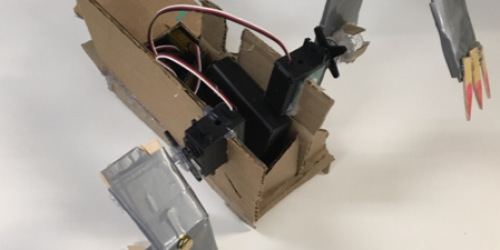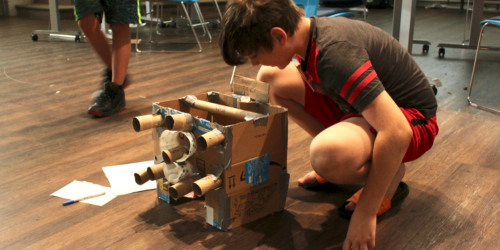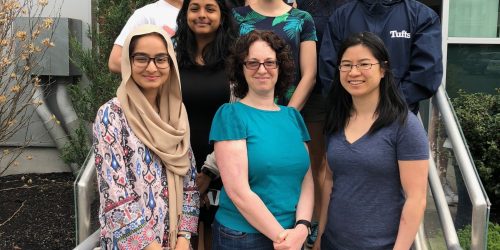by Amanda Strawhacker, Doctoral Student in Child Study and Human Development and Miki Vizner, Master’s Student in Child Study and Human Development
Makerspaces are an exciting space to foster creative learning through building artifacts. These 21st century engineering workshops are a growing area of interest for both education researchers and school practitioners, and many resources (e.g. makered.org) refer to the benefits of making for children as young as Kindergarten aged. However, most makerspaces are designed for much older age group. With support from the CEEO Innovation Fund, Ph.D. student Amanda Strawhacker and M.A. student Miki Vizner, both of Tufts’ Eliot-Pearson Department of Child Study and Human Development, set out to research and develop a developmentally appropriate Early Childhood Makerspace, for children ages 4-8 years. This mission of this space is, 1) to serve an active making community of children and their guardians or educators, and 2) to provide a testing site for Tufts researchers to investigate making and learning in early childhood.

Amanda and Miki worked from May through September of 2016 to explore the questions, “what is an early childhood makerspace?” In order to investigate this question, they leveraged the Tufts research and engineering community by:
- Hosting brainstorming sessions with educators, industry professionals, and community makers
- Taking courses and conducting academic investigations on the space design for this age group
- Working with Tufts engineering students to build prototypes of novel making tools and technologies for young children (including a vacuum former for children, a water table to model electrical current, and big-KIBO, a rideable sit-on-top version of the KIBO robot)
Based on this early work, Amanda and Miki redesigned a corner of the Evelyn G. Pitcher Curriculum Resource Lab in Eliot-Pearson, and created the Early Childhood Makerspace at Tufts. The room contains large building elements (e.g. Rig-a-majig, building blocks), traditional craft and building equipment (e.g. hand tools and power tools, textiles, crayons, markers, magnets) and robotic kits and rapid prototyping technologies (e.g. KIBO robotic kits, BeeBot robots, LEGO WeDo 2.0 kits, a vinyl cutter, and Sense Mother smart sensors).
Currently, Kindergarten children from the affiliated Eliot-Pearson Children’s School visit the space each week, and Amanda and Miki are researching their making and learning. Preliminary findings support the idea that children aged 4-7 years are capable of learning concepts of science, technology, engineering, arts, and math, as long as the tools and learning space are appropriate for them.
Over the last year with the help of the CEEO Innovation Fund, Amanda and Miki have gone from an idea for a programmable room to a dynamic early childhood makerspace, grounded in child development research and practice, that serves a growing community of educators, families, researchers, and most importantly, young child makers. The space is currently open to the Tufts community. Learn more at: http://ase.tufts.edu/devtech/makerspace.html. To propose your own research project, email amanda.strawhacker@tufts.edu.




